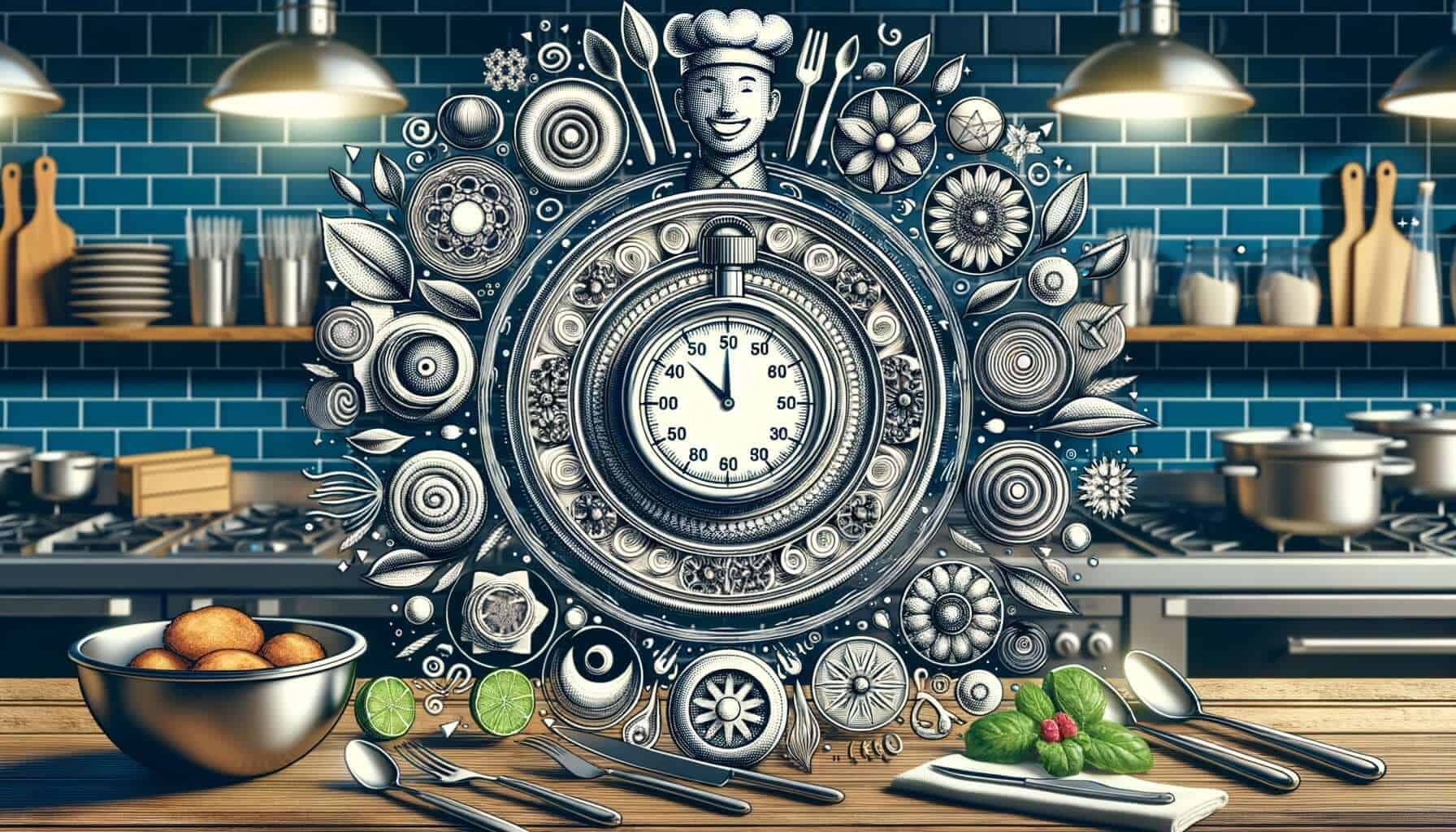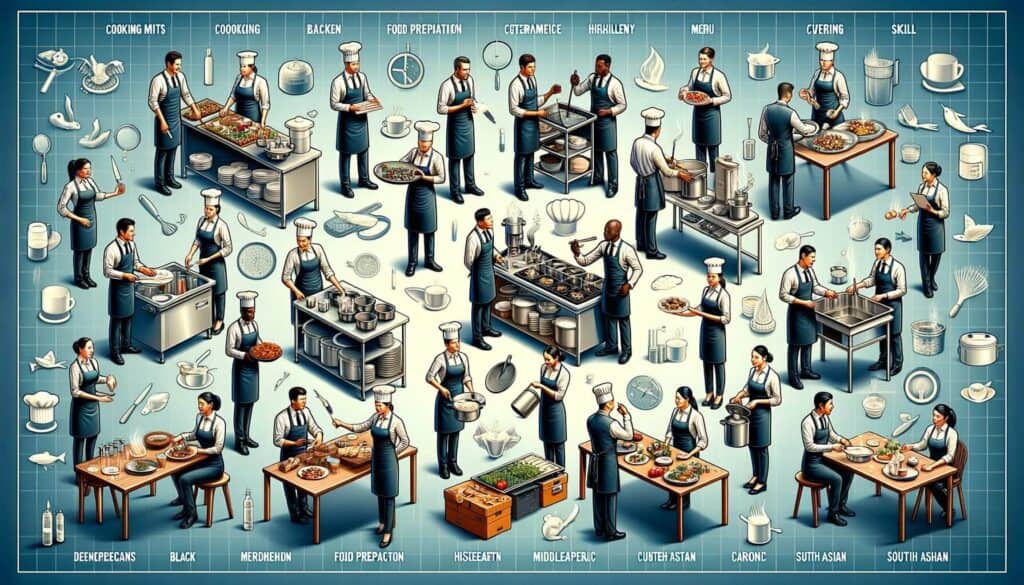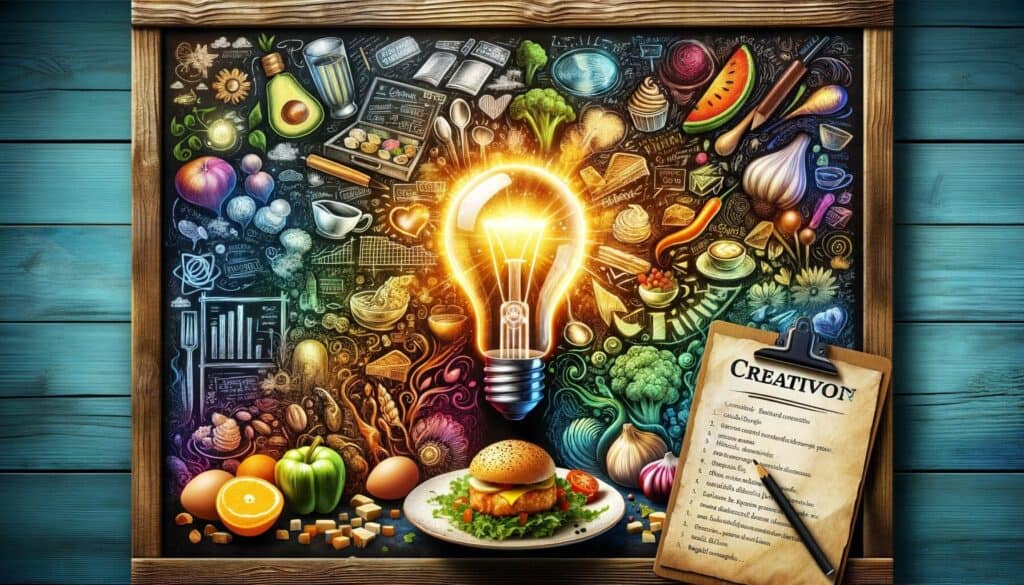
By Jermaine Thomas March 18, 2025
Catering is a highly competitive industry that requires a unique set of skills and qualities to succeed. Whether it’s a wedding, corporate event, or private party, the success of an event often hinges on the quality of the food and service provided by the caterer. In this article, we will explore the essential skills and qualities to look for in caterers, and how they contribute to the overall success of an event.
Essential Culinary Skills for Caterers

One of the most important skills a caterer must possess is culinary expertise. A caterer should have a deep understanding of various cooking techniques, flavor profiles, and food presentation. They should be able to create delicious and visually appealing dishes that cater to a wide range of tastes and dietary restrictions.
1. Knowledge of Different Cuisines: A skilled caterer should have a diverse knowledge of different cuisines, including international and regional specialties. This allows them to create menus that cater to a variety of tastes and preferences.
2. Cooking Techniques: A caterer should be proficient in a wide range of cooking techniques, including grilling, baking, sautéing, and frying. This ensures that they can prepare a variety of dishes to perfection.
3. Menu Planning: Menu planning is a crucial skill for caterers. They should be able to create well-balanced menus that offer a variety of flavors and textures. A caterer should also be able to accommodate dietary restrictions and allergies.
4. Food Presentation: Presentation is key in the catering industry. A caterer should have an eye for detail and be able to create visually stunning dishes that are as pleasing to the eye as they are to the palate.
Creativity and Menu Development

Creativity is an essential quality for a caterer. It allows them to develop unique and innovative menus that set them apart from their competitors. A caterer should be able to think outside the box and come up with creative solutions to meet the specific needs and preferences of their clients.
1. Menu Customization: A skilled caterer should be able to customize menus to suit the theme, budget, and dietary requirements of an event. They should be able to offer a variety of options and suggest creative alternatives to traditional dishes.
2. Seasonal and Local Ingredients: Using seasonal and locally sourced ingredients not only ensures freshness but also supports local farmers and producers. A caterer should have a good understanding of seasonal ingredients and be able to incorporate them into their menus.
3. Signature Dishes: Developing signature dishes can help a caterer stand out from the competition. These dishes should showcase the caterer’s unique style and creativity, leaving a lasting impression on clients and guests.
Organization and Time Management

Catering events require meticulous planning and organization. A caterer should be able to handle multiple tasks simultaneously and ensure that everything runs smoothly on the day of the event. Time management is crucial to ensure that all dishes are prepared and served on time.
1. Event Planning: A caterer should have strong organizational skills to plan and execute events seamlessly. This includes coordinating with clients, vendors, and staff, as well as managing budgets and timelines.
2. Inventory Management: Proper inventory management is essential to ensure that all necessary ingredients and supplies are available for each event. A caterer should be able to keep track of inventory, order supplies in a timely manner, and minimize waste.
3. Scheduling and Staff Management: A caterer should be able to create schedules for their staff, ensuring that there are enough hands on deck to handle each event. They should also be able to delegate tasks effectively and provide clear instructions to their team.
Communication and Interpersonal Skills

Effective communication is vital in the catering industry. A caterer should be able to communicate clearly and professionally with clients, staff, and vendors. They should also possess strong interpersonal skills to build and maintain relationships with clients and ensure client satisfaction.
1. Active Listening: A caterer should be an active listener, paying attention to the needs and preferences of their clients. This allows them to tailor their services to meet the specific requirements of each event.
2. Clear and Concise Communication: A caterer should be able to communicate their ideas, instructions, and expectations clearly and concisely. This ensures that everyone involved in the event understands their role and responsibilities.
3. Conflict Resolution: In the fast-paced catering industry, conflicts and challenges are bound to arise. A skilled caterer should be able to handle conflicts calmly and professionally, finding solutions that satisfy all parties involved.
Attention to Detail and Presentation
Attention to detail is a quality that sets exceptional caterers apart from the rest. From food presentation to table settings, every aspect of an event should be meticulously planned and executed to create a memorable experience for guests.
1. Food Presentation: A caterer should pay close attention to the presentation of their dishes. This includes the arrangement of food on plates, garnishing, and the use of decorative elements. A visually appealing presentation enhances the overall dining experience.
2. Table Settings: The table settings at an event play a significant role in creating the desired ambiance. A caterer should have an eye for detail and be able to create elegant and cohesive table settings that complement the theme of the event.
3. Décor and Aesthetics: In addition to food presentation and table settings, a caterer should also consider the overall aesthetics of the event. This includes the choice of linens, centerpieces, lighting, and other decorative elements that contribute to the overall atmosphere.
Adaptability and Problem-Solving Abilities
The catering industry is dynamic and ever-changing. A caterer should be able to adapt to different situations and handle unexpected challenges that may arise during an event. Problem-solving skills are essential to ensure that any issues are resolved quickly and efficiently.
1. Flexibility: A caterer should be flexible and able to adapt to last-minute changes or requests from clients. This includes changes in the menu, guest count, or event timeline. Being able to think on their feet and make quick decisions is crucial in the catering industry.
2. Crisis Management: Despite meticulous planning, unforeseen circumstances can occur during an event. A skilled caterer should be able to handle crises calmly and efficiently, finding solutions that minimize disruption and ensure the smooth running of the event.
3. Resourcefulness: A caterer should be resourceful and able to find creative solutions to problems that may arise. This includes finding alternative ingredients, equipment, or staffing solutions in case of emergencies or unexpected challenges.
Knowledge of Food Safety and Hygiene Practices
Food safety and hygiene are of utmost importance in the catering industry. A caterer should have a thorough understanding of food safety regulations and best practices to ensure that all food served is safe and free from contamination.
1. Food Handling and Storage: A caterer should have a good understanding of proper food handling and storage practices. This includes maintaining proper temperatures, preventing cross-contamination, and ensuring that all food is stored in appropriate conditions.
2. Sanitation and Cleanliness: A clean and sanitary kitchen is essential to prevent foodborne illnesses. A caterer should have strict sanitation protocols in place and ensure that all staff members adhere to them.
3. Food Safety Certifications: Many catering companies require their staff to have food safety certifications. These certifications demonstrate that the caterer has received proper training in food safety practices and is committed to maintaining high standards.
Customer Service and Client Satisfaction
Customer service is a crucial aspect of the catering industry. A caterer should be able to provide exceptional service to their clients, ensuring that their needs and expectations are met or exceeded.
1. Client Consultation: A caterer should conduct thorough consultations with clients to understand their vision, preferences, and budget. This allows them to tailor their services to meet the specific requirements of each event.
2. Responsiveness: Timely and effective communication is key to providing excellent customer service. A caterer should respond promptly to client inquiries, provide regular updates, and be available to address any concerns or questions.
3. Professionalism: A caterer should conduct themselves in a professional manner at all times. This includes being punctual, dressing appropriately, and treating clients and guests with respect and courtesy.
Teamwork and Leadership Skills
Catering events require a team effort, and a caterer should possess strong teamwork and leadership skills to ensure that all staff members work together cohesively to deliver a successful event.
1. Delegation: A skilled caterer should be able to delegate tasks effectively, ensuring that each staff member knows their role and responsibilities. This allows for a smooth workflow and ensures that all tasks are completed on time.
2. Motivation and Encouragement: A caterer should be able to motivate and encourage their team members, fostering a positive and productive work environment. Recognizing and rewarding the efforts of staff members can boost morale and enhance teamwork.
3. Conflict Resolution: In a high-pressure environment like catering, conflicts among staff members can arise. A caterer should be able to handle conflicts calmly and professionally, finding resolutions that maintain harmony within the team.
FAQs
Q: What qualifications should I look for in a caterer?
A: While formal qualifications are not always necessary, it is beneficial to look for a caterer who has received culinary training or has relevant certifications in food safety and hygiene.
Q: How can I assess a caterer’s culinary skills?
A: You can assess a caterer’s culinary skills by requesting a tasting session or reviewing their portfolio of past events. This allows you to sample their dishes and evaluate their presentation and flavor profiles.
Q: How important is creativity in catering?
A: Creativity is essential in catering as it allows caterers to develop unique menus and dishes that set them apart from their competitors. Creative solutions can also help caterers meet the specific needs and preferences of their clients.
Q: What should I look for in a caterer’s portfolio?
A: When reviewing a caterer’s portfolio, look for a variety of menus and dishes that showcase their versatility and creativity. Pay attention to the presentation of the dishes and the overall aesthetic of the events they have catered.
Q: How can I ensure that a caterer follows food safety and hygiene practices?
A: You can ask a caterer about their food safety protocols and certifications. Additionally, you can request references from past clients to inquire about their experiences with the caterer’s adherence to food safety and hygiene practices.
Conclusion
Choosing the right caterer for your event is crucial to its success. By considering the skills and qualities discussed in this article, you can ensure that you hire a caterer who possesses the culinary expertise, creativity, organization, communication, attention to detail, adaptability, knowledge of food safety, customer service, and teamwork skills necessary to deliver an exceptional dining experience.
Remember to conduct thorough research, request tastings or samples, and communicate your expectations clearly to find the perfect caterer for your event.